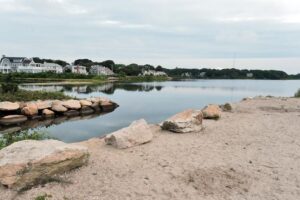“New Research Projects Will Focus On Coastal Issues In Falmouth And Beyond“
• By Gilda Geist, 2/16/24 in The Falmouth Enterprise, page 11 and online
Woods Hole Oceanographic Institution (WHOI) Sea Grant is funding five research projects focused on coastal issues and water quality in Massachusetts. The projects will explore eelgrass restoration, impact of sewers on water quality, the presence of contaminants in mussels and more.
These projects were chosen because they “directly reflect the real-world challenges faced by coastal communities, ensuring that the outcomes are not just scientifically robust but also deeply relevant and impactful,” WHOI Sea Grant Director Matthew Charette said in a WHOI Sea Grant press release.

The most Falmouth-centric of the five projects looks at how the Little Pond ecosystem has responded to sewering. The Little Pond area was sewered in 2016 to reduce the amount of nitrogen entering the pond. WHOI scientist Matthew H. Long and Marine Biological Laboratory scientists Ketil Koop-Jackobson and Kenneth H. Foreman—who is also on the Falmouth Water Quality Management Committee—will be measuring and assessing how nutrients flow into and through Little Pond. This will help scientists better understand how changes like sewering impact coastal ecosystems.
Another project will focus on understanding why property owners might choose to not have flood insurance and how to encourage them to purchase that insurance.
“While threats from sea level rise, hurricanes, and winter storms are increasing in coastal communities, Massachusetts flood insurance enrollments are not,” the press release from WHOI Sea Grant says. “In fact, participation in flood insurance policies declined in recent years, particularly on Cape Cod, leaving homeowners vulnerable to the growing impacts of climate change.”
For this project, WHOI researchers Di Jin and Michael J. Weir will survey homeowners.
A third project is based on a partnership with WHOI researchers Caroline Ummenhofer, Svenja Ryan and Glen Gawarkiewicz and the Cape Cod Commercial Fishermen’s Alliance. The team will collect catch-related data in areas off the Outer Cape that are not sampled as often as more accessible locations.
“With tools to visualize the data, fishers can make real-time science-based decisions, while the data provides scientists with a better understanding of changing ocean conditions,” the press release says.
Eelgrass has been disappearing for many years along Cape Cod, due to poor water quality, which in turn has meant habitat loss for aquatic life. Another Sea Grant project will focus on testing and identifying best practices for restoring eelgrass by planting eelgrass seeds. This research will yield information that will help inform future, large-scale eelgrass restoration efforts. Researchers from the University of Massachusetts Boston, the Massachusetts Division of Marine Fisheries and Salem Sound Coastwatch are leading this project.
The fifth project will study how certain contaminants from wastewater impact mussels’ biology. Like nitrogen, a number of contaminants from wastewater can travel from septic systems all the way into coastal ecosystems. These “contaminants of emerging concern,” or CECs, consist of pharmaceuticals and endocrine-disrupting chemicals, the press release says. New septic system technology can remove these CECs, and WHOI researcher Jared Goldstone and UMass Boston researcher Helen Poynton will be studying how well these septic systems prevent CECs from reaching coastal ecosystems.
Sea Grant is a program based at WHOI and funded by the National Oceanic and Atmospheric Administration. Each US state that has coastline or borders the Great Lakes has at least one Sea Grant program housed at a university, as does Puerto Rico and Guam. These programs focus on creating healthy coastal environments and bolstering coastal economies.
